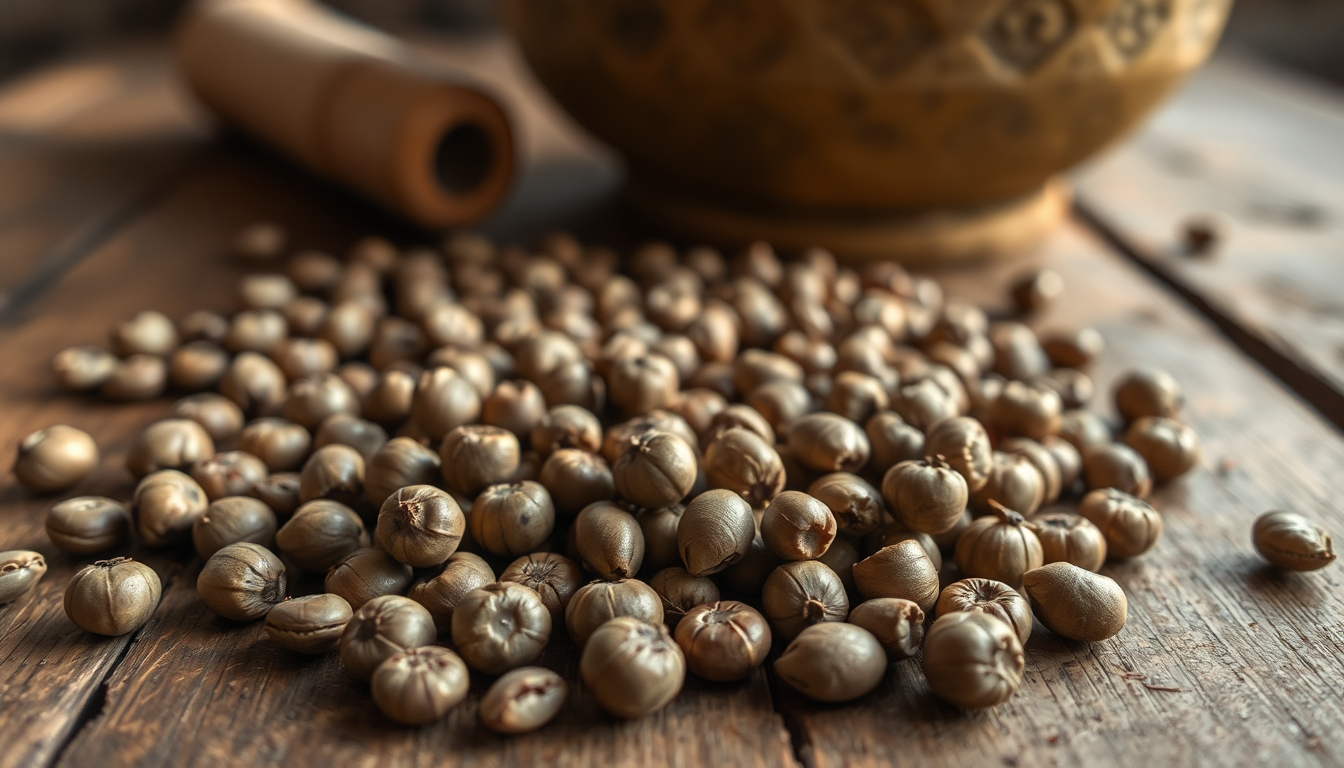Exploring the Mystical Ololiuqui Seeds: A Guide for UK Enthusiasts

In the captivating world of ethnobotany, few plants hold as much intrigue and cultural significance as the Ololiuqui, also known as the Rivea corymbosa. This mystical seed, native to Mexico and Central America, has been revered for centuries by indigenous communities for its profound spiritual and medicinal properties. As interest in alternative and traditional remedies continues to grow, the Ololiuqui has garnered increasing attention from curious enthusiasts in the UK.
The Botanical Enigma of Ololiuqui
The Ololiuqui, or Rivea corymbosa, is a climbing vine that belongs to the morning glory family, Convolvulaceae. Its delicate white flowers and heart-shaped leaves belie the potent compounds that lie within its small, brown seeds. Botanically, the Ololiuqui is closely related to other psychoactive morning glory species, such as the Hawaiian Baby Woodrose (Argyreia nervosa) and the common morning glory (Ipomoea purpurea).
Originating in the tropical regions of Mexico and Central America, the Ololiuqui has a long history of use by indigenous cultures, particularly the Aztecs and the Mazatec people. These ancient civilizations revered the plant for its spiritual and medicinal properties, incorporating it into their religious ceremonies and traditional healing practices.
The Chemical Composition of Ololiuqui
The Ololiuqui seed contains a complex array of bioactive compounds, the most notable of which are the ergoline alkaloids. These include d-lysergic acid amide (LSA), which is structurally similar to the better-known d-lysergic acid diethylamide (LSD). While the Ololiuqui's psychoactive effects are often compared to those of LSD, the experience is generally described as more introspective and less visually intense.
In addition to the ergoline alkaloids, the Ololiuqui seed also contains other potentially beneficial compounds, such as the tryptamines and the tropane alkaloids. The synergistic interplay of these various phytochemicals is believed to contribute to the plant's unique and profound effects on the human mind and body.
Traditional Uses of Ololiuqui
The Ololiuqui has a long and storied history of traditional use among indigenous cultures in Mexico and Central America. For the Aztecs, the Ololiuqui was considered a sacred plant, used in religious ceremonies and divination rituals. The Mazatec people, in particular, have a rich tradition of using the Ololiuqui in their shamanic practices, employing it as a tool for spiritual exploration, healing, and the attainment of altered states of consciousness.
In traditional Mazatec medicine, the Ololiuqui has been used to treat a variety of ailments, including headaches, anxiety, depression, and even certain types of addiction. The seeds are often ground into a powder and consumed in a ceremonial context, with the user seeking to connect with the plant's spirit and the divine realm.
Modern Research and Potential Benefits
As interest in the Ololiuqui has grown in recent years, researchers have begun to explore the plant's potential therapeutic benefits. While the scientific literature is still relatively limited, some studies have suggested that the Ololiuqui may possess a range of beneficial properties, including:
- Anxiolytic (anti-anxiety) effects
- Antidepressant-like activity
- Potential for the treatment of addiction
- Neuroprotective properties
- Possible applications in the management of chronic pain
However, it is important to note that much of the research on the Ololiuqui is still in the early stages, and more comprehensive studies are needed to fully understand its therapeutic potential and safety profile.
The Legal Status of Ololiuqui in the UK
The legal status of the Ololiuqui (Rivea corymbosa) in the UK is a complex and often confusing topic. While the plant itself is not specifically prohibited, the active compounds it contains, such as LSA, are subject to various regulations and restrictions.
In the UK, the Misuse of Drugs Act 1971 classifies LSA as a controlled substance, placing it under the same legal framework as LSD. This means that the possession, cultivation, and distribution of the Ololiuqui seed, or any product containing LSA, is generally prohibited without a valid license or exemption.
It is important for UK-based enthusiasts to thoroughly research and understand the current legal landscape surrounding the Ololiuqui, as the laws and regulations can vary depending on the specific context and intended use of the plant. Consulting with legal professionals or relevant authorities is strongly recommended to ensure compliance and avoid any potential legal issues.
Cultivating and Harvesting Ololiuqui
For those interested in growing their own Ololiuqui, it is essential to understand the plant's specific cultivation requirements. The Ololiuqui thrives in warm, tropical climates and requires well-drained, nutrient-rich soil. In the UK, it may be possible to grow the plant indoors or in a greenhouse, but the growing conditions can be challenging.
Harvesting the Ololiuqui seeds requires careful timing and attention to detail. The seeds should be collected when the seed pods have fully matured and begun to split open, typically in the late summer or early fall. It is important to handle the seeds with care, as they can be sensitive to light, heat, and moisture.
Preparing and Consuming Ololiuqui
The traditional method of consuming Ololiuqui involves grinding the dried seeds into a fine powder and then ingesting it, often in the context of a ceremonial or spiritual practice. The powder may be mixed with water, juice, or other liquids, and the dosage is typically carefully measured and monitored.
In modern adaptations, some individuals may choose to extract the active compounds from the Ololiuqui seeds using various solvents or techniques. However, it is crucial to exercise extreme caution when attempting any extraction or purification processes, as improper methods can result in the production of potentially dangerous substances.
Safety Considerations and Potential Risks
The use of Ololiuqui, like any psychoactive substance, carries inherent risks and should be approached with the utmost care and responsibility. Potential side effects may include nausea, vomiting, dizziness, and changes in perception and cognition. Additionally, the Ololiuqui may interact with certain medications, particularly those that affect serotonin levels in the brain.
It is essential for individuals interested in exploring the Ololiuqui to thoroughly research the potential risks, consult with healthcare professionals, and only consume the plant under the guidance of experienced and reputable practitioners. Responsible and informed use is crucial to minimizing the potential for harm.
Sourcing Ololiuqui Seeds in the UK
For UK-based enthusiasts, the availability of Ololiuqui seeds can be somewhat limited due to the legal complexities surrounding the plant. However, there are a few reputable online vendors and specialty shops that may offer Ololiuqui seeds or related products, such as Herbalmonkey.
When purchasing Ololiuqui seeds, it is essential to ensure that the source is reliable and that the product is of high quality. Factors to consider include the seed's appearance, freshness, and any available information about the cultivation and handling practices.
Conclusion
The Ololiuqui, or Rivea corymbosa, is a captivating and enigmatic plant that has captured the imagination of spiritual seekers, researchers, and curious enthusiasts around the world. Its rich history, complex chemical composition, and potential therapeutic benefits make it a fascinating subject of study and exploration.
For UK-based individuals interested in the Ololiuqui, navigating the legal landscape and sourcing high-quality products can be a challenging but rewarding endeavor. By approaching the use of this plant with respect, caution, and a commitment to responsible exploration, UK enthusiasts can potentially unlock the profound insights and benefits that the Ololiuqui has to offer.
As research continues and our understanding of the Ololiuqui deepens, the future holds exciting possibilities for the integration of this remarkable plant into the broader landscape of alternative and traditional medicine. The journey of discovery has only just begun.






